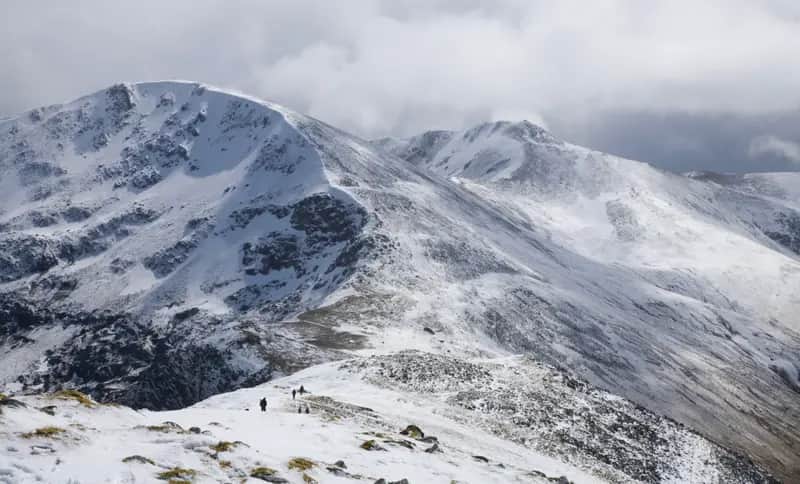I WAS LEFT HUMBLED BY A WALK WITH A REMARKABLE MAN

TEAM EFFORT: Michael in training for his long-distance walk with daughter Fiona, left, and daughter-in-law Nina

MICHAEL'S WAY: Route map
I ALWAYS regard myself fortunate to have met some extraordinary people during my years in the mountains but Michael Anderson may be the most extraordinary of them all.
Michael is 75. He is blind and mostly deaf. Despite this, he is about to undertake a 210-mile walk across the breadth of Scotland.
His trek follows the line of St Columba's Way - with a few personalised tweaks - starting from the island of Iona off the west of Mull on May 6 and terminating 16 days later on the east coast at St Andrews.
During that time, Michael, supported by daughter Fiona and daughter-in-law Nina and a team of volunteer guides, will cross some challenging terrain with a total ascent of more than 5000 metres. The walk is entirely self-supported with the party carrying all the gear needed for many nights of wild camping.
The route uses island roads, lonely glens and drover's tracks and trails including sections of the Rob Roy Way and the Fife Coastal Path. Michael is hoping to raise £15,000 for Deafblind Scotland, a charity close to his heart, to create a new learning and development centre, The Field of Dreams.
Meeting Michael for the first time brings forth a jumble of emotions. Any pre-conceived images of a frail pensioner are immediately dispelled. He stands tall and erect, his handshake is firm, his voice confident, unshaken.
He looks and sounds a lot less than his 75 years, but then this is a man who, despite his disabilities, has completed triathlons, summited Ben Nevis and abseiled off the Forth Rail Bridge. He is also planning a 50-mile cycle ride in his charity push.
After just a few minutes in his company I was left with no doubt that he will complete the walk he is calling Michael's Way, a reference to the rules and adjustments he has had to make for everyday life.
For the vast majority, walking in our great outdoors is all about the sights and the sounds, taking in the constantly changing views and picking up the whisper of the wind, the babble or rush of the water, the calls of wildlife.
Away from the confused cacophony of everyday life, when it is just one to one in the emptiness and peace of a wood or country track, hearing aids allow Michael to hold a conversation and pick up certain noises.
It's well nigh impossible for most of us to imagine what life would be like deprived of sight and sound. Michael had to think for a minute or two when I asked him about this, but then he talked beautifully about what he experiences.
He spoke about feeling the wind, from gentle breeze to full-force blasts. He spoke of the changing temperatures, from the feel of the sun on his face and the effects of the rain, the gentle coolness of a light drizzle to the often under-rated effects of a steady fall, things most of us regard as annoyances rather than something to be savoured.
It may be we concentrate so much on sight and sound we forget about the simpler sensory pleasures that can be gleaned from nature itself.
When you guide Michael, he can tell a lot about the terrain by your body movement just from his hold on your arm. It's all about balance and sense of touch. Part of the guide's job is also to describe the ground conditions and the scenery you are passing through, a task that is now second nature to Nina and Fiona.
The whole experience with this eloquent and dignified man leaves you feeling slightly humbled. Rather than complain about his disabilities and where life has taken him, he quietly gets on with things, thinking more of the plight of others.
You can be sure the next time one of my mountain friends moans on about being too tired to go out or how they couldn't be bothered making the effort, I will remind them of just how pathetic that sounds.
You can make a donation to this wonderful cause at https://www.justgiving.com/MichaelsWay

